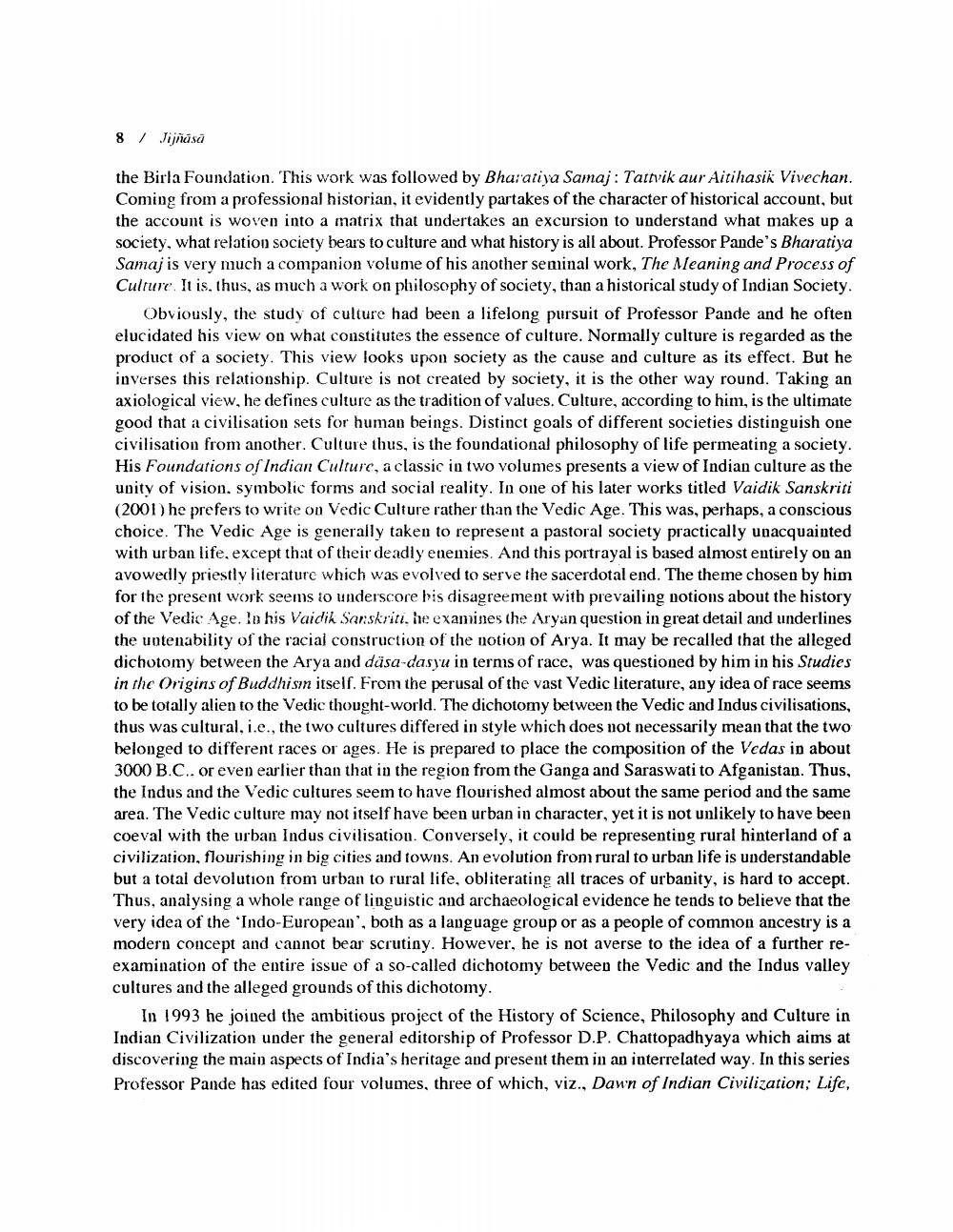________________
8
/
Jijnása
the Birla Foundation. This work was followed by Bharatiya Samaj: Tattvik aur Aitihasik Vivechan. Coming from a professional historian, it evidently partakes of the character of historical account, but the account is woven into a matrix that undertakes an excursion to understand what makes up a society, what relation society bears to culture and what history is all about. Professor Pande's Bharatiya Samaj is very much a companion volume of his another seminal work, The Meaning and Process of Culture. It is, thus, as much a work on philosophy of society, than a historical study of Indian Society.
Obviously, the study of culture had been a lifelong pursuit of Professor Pande and he often elucidated his view on what constitutes the essence of culture. Normally culture is regarded as the product of a society. This view looks upon society as the cause and culture as its effect. But he inverses this relationship. Culture is not created by society, it is the other way round. Taking an axiological view, he defines culture as the tradition of values. Culture, according to him, is the ultimate good that a civilisation sets for human beings. Distinct goals of different societies distinguish one civilisation from another. Culture thus, is the foundational philosophy of life permeating a society. His Foundations of Indian Culture, a classic in two volumes presents a view of Indian culture as the unity of vision, symbolic forms and social reality. In one of his later works titled Vaidik Sanskriti (2001) he prefers to write on Vedic Culture rather than the Vedic Age. This was, perhaps, a conscious choice. The Vedic Age is generally taken to represent a pastoral society practically unacquainted with urban life, except that of their deadly enemies. And this portrayal is based almost entirely on an avowedly priestly literature which was evolved to serve the sacerdotal end. The theme chosen by him for the present work seems to underscore his disagreement with prevailing notions about the history of the Vedic Age. In his Vaidik Sanskriti. he examines the Aryan question in great detail and underlines the untenability of the racial construction of the notion of Arya. It may be recalled that the alleged dichotomy between the Arya and düsa-dasyu in terms of race, was questioned by him in his Studies in the Origins of Buddhism itself. From the perusal of the vast Vedic literature, any idea of race seems to be totally alien to the Vedic thought-world. The dichotomy between the Vedic and Indus civilisations, thus was cultural, i.e., the two cultures differed in style which does not necessarily mean that the two belonged to different races or ages. He is prepared to place the composition of the Vedas in about 3000 B.C.. or even earlier than that in the region from the Ganga and Saraswati to Afganistan. Thus, the Indus and the Vedic cultures seem to have flourished almost about the same period and the same area. The Vedic culture may not itself have been urban in character, yet it is not unlikely to have been coeval with the urban Indus civilisation. Conversely, it could be representing rural hinterland of a civilization, flourishing in big cities and towns. An evolution from rural to urban life is understandable but a total devolution from urban to rural life, obliterating all traces of urbanity, is hard to accept. Thus, analysing a whole range of linguistic and archaeological evidence he tends to believe that the very idea of the 'Indo-European', both as a language group or as a people of common ancestry is a modern concept and cannot bear scrutiny. However, he is not averse to the idea of a further reexamination of the entire issue of a so-called dichotomy between the Vedic and the Indus valley cultures and the alleged grounds of this dichotomy.
In 1993 he joined the ambitious project of the History of Science, Philosophy and Culture in Indian Civilization under the general editorship of Professor D.P. Chattopadhyaya which aims at discovering the main aspects of India's heritage and present them in an interrelated way. In this series Professor Pande has edited four volumes, three of which, viz., Dawn of Indian Civilization; Life,




